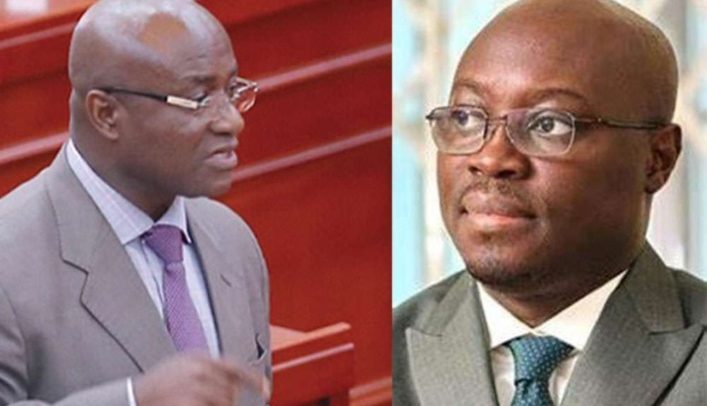Osei Kyei-Mensah-Bonsu and Dr. Ato Forson
The Minority Leader, Dr. Ato Forson, says Ghana has travelled a long way and is making some considerable democratic progress.
“And in Africa, Ghana’s democracy is one of the best. My plea is that even as Members of Parliament, we should be sensitive to the needs of the public in making laws and doing things the way that will benefit the people,” he asserted.
Speaking at a media engagement with the leadership of Parliament, the Minority Leader said democracy has helped the country move forward.
“Our job here is to guard against the derailment of our democracy because this democracy has helped the country to go forward, and we have to protect it,” he stressed.
He added, “In as much as we are here to do our work, we have a responsibility to assist Ghana to maintain this democracy, and I think that all of us must take it seriously.”
Dr. Ato Forson intimated that the current democracy is “most enduring and the one that has prospered in this country.”
“In fact, it has its own weakness and we are working to perfect it as time goes on,” he noted.
He continued, “You will agree with me that yesterday [referring to Tuesday], we introduced new Standing Orders and there are some major reforms that Parliament, through the Speaker and experienced people like my good friend, Suame Messi, have introduced.”
“I am sure over the years the work of Parliament, you can agree with me, is evolving and changing and correcting itself.
“We are aiming for the best; we are not perfect. If we get something wrong, we call on the public to correct us, but we are here to help this democracy to mature,” he said.
Majority
The Majority Leader, Osei Kyei-Mensah-Bonsu, on his part, was worried about the high attrition rate in Parliament and blamed the political parties for this development.
“For the NDC, five MPs elected not to contest. When they went into the primaries, 17 of them were not successful to have retained their slots and represent their constituencies, bringing their number to 22.
“For the NPP, 18 elected not to contest and 28 lost. And that means that 46 out of the 137 will not be contesting, which is about a third of those who will not be contesting,” he said.
According to him, the longer MPs serve in Parliament, the better they do their jobs, adding, “I keep saying that it doesn’t take one year or one term to build the capacity of an MP. It is much more than that.”
He argued that if one wants to discover a person’s true relevance, let him serve in Parliament for two terms and see how the person blossoms.
“If after two terms into the third term the person is not maturing, then perhaps you can draw your conclusion.
“But first time the person comes, so much resources are spent to blow the capacity of that person and just after the first term the person is peeled off at the expense of the state.
“I dare say the political parties are causing huge financial loss to the country, and I think that we really need to come together to interrogate our constitutions of the political parties to do what is needful,” he stated.
The Majority Leader stated that he was unaware of this practice in any of the established democracies, where the sluice gates are open to all comers at the end of the legislative session.
“Whoever thinks he is qualified to contest comes forth to contest. It does not exist anywhere. What pertains in the established democracy is the leadership of the political parties assess the performance of the members and pass on the report to the party,” he said.
According to him, if there is a problem with a person’s function, they can call and advise him.
He pointed out that if he stiffened his neck and refused to bend or reform after two, three, or four assessments, the parliamentary group might inform the party that he is not “a gooder” and “is not helping the course, and we do not see him in parliament.”
By Ernest Kofi Adu, Parliament House


